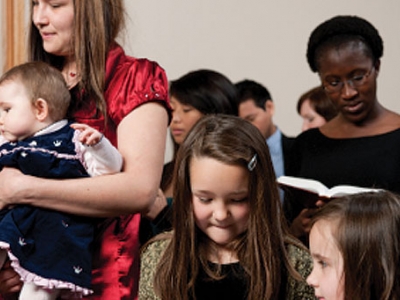
The ABC of caring for your church family
Loving one another and caring for each other in our church communities
You’ve just settled into a comfy chair with your Bible open on your lap and a hot drink. The Bible study gets started and everyone is getting into the discussion. The door bangs and in comes the last member of the group. She sits down and hurriedly apologises for her lateness. You realise she is barely holding it together, her eyes are red and swollen, her hands are shaking. The atmosphere of the room shifts from warm and comfortable to decidedly uncomfortable, charged with silent emotion. Do you:
a) Ignore the emotion and go on with Bible study,
b) Offer a tissue and quick rub on the back and promise time to share prayer points at the end,
c) Ask what’s wrong and when she politely demurs, breathe a silent sigh of relief and get on with the study or
d) Acknowledge her emotion and gently give her permission to share, or
e) Some other combination of responses.
It’s hard to know what is the right choice isn’t it? It depends on so many variables and details. We aren’t in the realm of right or wrong here but wisdom, though our choice will definitely prove to have either helpful or harmful consequences. But there is no command in the Bible saying, ‘You should let each other cry even when you arrive late to Bible study’. Jesus does command us to love one another (John 13:35). We know from his example that love is servant-hearted, generous and truthful. But it’s so hard to know what that really looks like in our everyday lives; days filled with washing up, dirty laundry, endless car trips to school or sport, another meal to prepare, serve, clean up after.
Here are a few things I’ve learned about caring for each other in our church communities. My ABC of loving others.
A is for being alongside.
There is no pride or sense that anyone is better than anyone else. We all have a long way to go, and will have successes and failures on the way. I can’t give all the answers, nor can I take away your suffering. But I can point to Jesus, and journey beside you as we look to him, and that sometimes means sitting beside you as you cry. Just being there and listening. Sometimes, with the little things that trouble us, having a friend who listens and acknowledges the pain is enough to help us face the world with renewed strength, knowing we aren’t alone.
B is for Bible.
God’s words are better than ours. Sometimes, after a lot of listening, there is a question or invitation to share our thoughts. Some great phrases to keep in mind are, ‘I will think about that more and get back to you’ or ‘I’m not sure, can I think about it a bit more?’. But when we do eventually speak, using the Bible is more powerful and effective than our own thoughts and views. This also guides us as we seek to guide others - if you can’t find the advice you want to give in the Bible, don’t give it with more than authority than it deserves. We might be convinced we know what’s best, but we know that God sees and knows everything. Knowing the Bible well reminds us of our place as children of the most powerful and loving heavenly Father.
C is for compassion.
Often it is a lack of compassion that drives our responses of ignoring another’s pain or avoiding that difficult conversation. If this is the third time that Bible study has been interrupted by the same friend dissolving into tears, your patience might run short. Only by remembering the gospel of grace, God’s immeasurable compassion for us will enable us to be compassionate to others. But don’t try to generate compassion within yourself - ask God to change your heart!
So you might be wondering if I’m going to tell you the answer to the dilemma of tears in Bible study. Nope. Sometimes (d) might be the right response, sometimes it might be (b) or some other combination that takes into account how well you know your distressed friend, her history, and so much more. I do hope you will be encouraged that loving one another doesn’t mean having all the answers or the right words straight away, but rather being willing to be there for the downs as well as the ups with a humble and compassionate heart.
For more articles from Growing Faith, subscribe to our monthly e-newsletter.
To hear about the latest books and resources from Youthworks Media, subscribe here.







